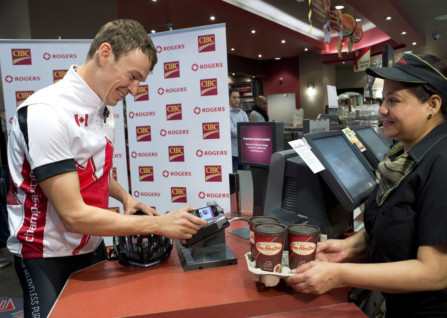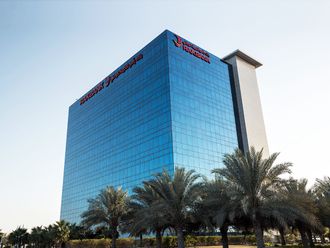
Tim Hortons, the popular Canadian coffee and doughnut chain, is the latest addition to the UAE’s mobile payment scene. The restaurant, with 19 branches in the Emirates, now offers mobile payment, making it possible for customers to pay for their favourite coffee, breakfast or lunch just by downloading an app.
The chain is joining a growing number of restaurants, retailers and shops that are ready to accept payments made by mobile phones as an alternative to cash, credit or debit cards. And banks, as well as technology providers and phone network operators, are the driving force behind it.
Among new providers is Dubai-based Beam. Beam has recently introduced a mobile payment solution called Beam Wallet, which is available in select Tim Hortons outlets, as well as at Subway, Cold Stone Creamery, select Géant and Al Maya supermarkets, and a growing number of other shopping outlets and restaurants across Dubai’s malls. The application enables users to pay, record and manage their spending on their smartphones, explains Nadim Khoury, Co-founder of Beam Wallet.
“The system is designed to work with any 3G phone running Android, BlackBerry or iOS operating systems and gives access to a network of retail, food and beverage businesses. We think the UAE is an ideal market for us to launch given the size and importance of the retail sector and the smartphone penetration rate,” he adds.
Adding to this, both Etisalat and du are working on offering the technical backbone for mobile payment solutions via Near Field Communication (NFC), using a payment technology that is linked to a customer’s bank account or credit card. Etisalat, after partnering with MasterCard and Research in Motion (BlackBerry) in mobile payments, will introduce a full-fledged mobile wallet system by mid-2013, says the company’s CEO, Saleh Abdullah Al Abdouli. And du has just rolled out a new range of NFC-enabled SIM cards that allow customers to use a number of banking and retail applications. The SIM card eventually transforms the phone into a virtual wallet. Tarik Ghanim, Business Development Director at du acknowledges that mobile payments are the primary driver for NFC .
Indeed, the UAE’s affluent society is increasingly embracing new ways of payments that replace cash and plastic, various studies have shown. “Consumers in the UAE, as well as in the entire Middle East have clearly developed a strong appetite for new ways to pay for their goods,” says Mick Holmes, Regional Managing Director, Middle East and Africa, First Data, a global payment processing company based in the US.
US-based Mobibucks recently announced a partnership with Middle East Payment Services, a consortium of seven banks throughout the Middle East, to bring mobile payments to the region, after a partnership with Abu Dhabi Commercial Bank to introduce such a system in the UAE. One of the most popular mobile payment services already in place in the UAE is mPay, a payment channel provided by the Dubai government to allow mobile or SMS payments for Dewa bills, traffic tickets, as well as police fines and, as of recently, Etisalat bills. Another significant cooperation in mobile payment is the one between Emirates NBD and Network International, one of the leading payment solutions providers in the Middle East.
Electronic payment is a market that is growing at 20 per cent annually, says Bhairav Trivedi, Network International’s CEO. A 2012 study conducted by UK-based TNS, a technology and business strategy firm, has shown that UAE consumers, behind Saudi Arabia’s, expressed the highest interest in mobile payment solutions across the Middle East. This corresponds with the results of a study undertaken by credit-card company MasterCard, the Mobile Payment Readiness Index, in which the UAE scores above average with regards to its advanced regulatory structure, good infrastructure and fertile environment for mobile payment solutions. However, unlike other advanced economies in the Middle East, the UAE is lagging in consumer readiness, MasterCard concluded, meaning that something, probably security concerns or technological barriers, is holding potential users back, or they are simply unaware of the solutions on offer.
“The UAE is one of the world’s centres of money transfer and remittance. UAE companies need to think outside the box to create and push new payment methods,” the report concluded.











